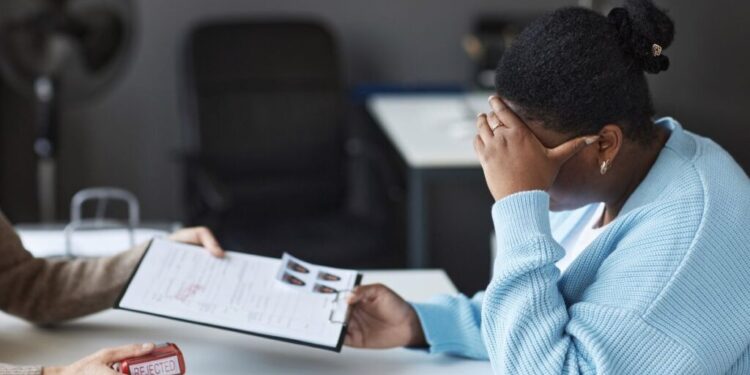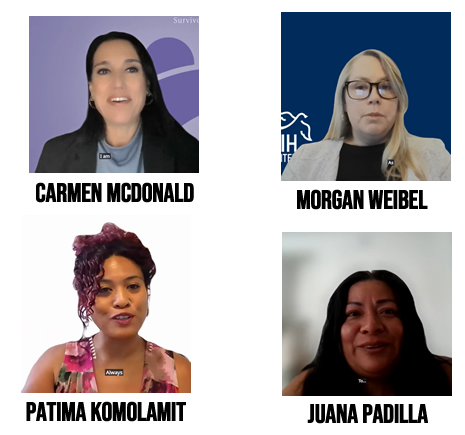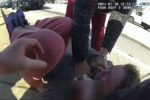El peso de las medidas migratorias impiden que sobrevivientes de violencia doméstica denuncien

POR PRENSA ATLANTA
- Las sobrevivientes inmigrantes de violencia doméstica enfrentan crecientes barreras a la seguridad y la justicia.
Las sobrevivientes que solicitan visas U otorgadas a las víctimas de delitos violentos, o visas VAWA; que permiten a las sobrevivientes solicitar estatus migratorio por separado de su pareja abusiva, se enfrentan a un mayor escrutinio y procedimientos de solicitud más estrictos.
Las protecciones de asilo para sobrevivientes de violencia de género también se han visto debilitadas.
Durante la videoconferencia llamada “Las sobrevivientes inmigrantes de violencia doméstica enfrentan crecientes barreras a la seguridad y la justicia”, organizada por American Community Media (ACoM), los participantes disertaron sobre los desafíos que los inmigrantes enfrentan y los posibles caminos de apoyo.
Se han aplicado nuevas restricciones anti-DEIA a las organizaciones de violencia doméstica que reciben subvenciones de agencias federales, como la Oficina de Violencia contra la Mujer y Vivienda y Desarrollo Urbano.
- La amenaza inminente de las redadas emprendidas por el Servicio de Inmigración y Control de Aduanas, ICE, ha creado un clima de miedo abrumador en las comunidades
inmigrantes: muchas sobrevivientes de violencia doméstica no denuncian el abuso.
-
- Cuatro ponentes subrayan los desafíos que enfrentan las migrantes víctimas de violencia doméstica y las posibles vías de apoyo:
Carmen McDonald, Directora Ejecutiva de Survivor Justice Center,
Patima Komolamit, Directora Ejecutiva de Center for the Pacific Asian Family
y Morgan Weibel, Directora de Client Advocacy/Legal Services, Tahirih Justice Center.
- Cuatro ponentes subrayan los desafíos que enfrentan las migrantes víctimas de violencia doméstica y las posibles vías de apoyo:
IMPACTO DEVASTADOR
Carmen McDonald, directora ejecutiva del Survivor Justice Center, señaló que cuando comenzaron las redadas migratorias, el miedo que estas generan, se extendió rápidamente entre los sobrevivientes, intensificando la desconfianza hacia las autoridades y mermando su intención de buscar ayuda.
“El impacto es devastador: aleja a las personas de la ayuda que necesitan y hace que nuestras comunidades sean cada día más
inseguras”, advirtió McDonald quien labora con sobrevivientes de violencia doméstica, agresión sexual y trata de personas. Su equipo ofrece asistencia principalmente en derecho familiar e inmigración, pero reconoce que el miedo entre los clientes se ha intensificado.
DISMINUYEN LAS DENUNCIAS
De acuerdo con la letrada, tras las redadas, las denuncias de discriminación y crímenes de odio disminuyeron en casi un tercio en el condado de Los Ángeles, no porque los incidentes se redujeran, sino porque las víctimas optaron por el silencio.
McDonald describió que un patrón similar se observa en los casos de violencia doméstica. Para contrarrestar esta tendencia, organizaciones y agencias gubernamentales han lanzado campañas de “conoce tus derechos”, con el fin de acercar información legal a quienes han optado por la clandestinidad. Sin embargo, el temor persiste, sobre todo entre las mujeres sobrevivientes. Y destacó que la incertidumbre es tal que muchas se preguntan si acudir a la corte para pedir una orden de protección podría convertirlas en blanco de una detención migratoria. “Cuando ven a agentes en sus vecindarios, vestidos de civil o con máscaras, o a cazarrecompensas llevándose a sus amigos y vecinos sin previo aviso, se preguntan: “Si voy a la corte para protegerme del abuso, ¿seré la siguiente? ¿Me van a arrestar?”, cuestionó.
SIN CARGOS CRIMINALES
Datos recientes muestran que numerosas personas detenidas en redadas no tenían cargos criminales, lo que acrecienta la sensación de vulnerabilidad.
“Imaginen que una persona que escapó del abuso finalmente se prepara para enfrentar a su agresor en el tribunal, pero en lugar de pensar en seguridad y justicia, se pregunta si ICE la estará esperando en la puerta”, señaló la abogada Morgan Weibel, directora de servicios legales del Tahirih Justice Center.
Weibel, quie fue la segunda oradora, relató el caso de una sobreviviente que solicitaba protección bajo VAWA y temió desistir de pedir una orden de protección permanente después de que un alguacil amenazara con denunciarla a inmigración. “No está sola”, advirtió, recordando que VAWA fue aprobada en 1994 como una histórica legislación bipartidista que dio a los sobrevivientes un camino para obtener estatus migratorio independiente de sus abusadores.
GOBIERNO HA ENDURECIDO PROCESOS DE REVISIÓN
La abogada Weibel subrayó que los parámetros y las condiciones para las víctimas han cambiado, pues el gobierno federal ha endurecido los procesos de revisión, “añadiendo entrevistas exhaustivas y permitiendo que incluso solicitantes con casos aprobados enfrenten procedimientos de deportación”.
- “Esta situación es una cuestión de vida o muerte, ya que las mujeres pueden ser deportadas a países donde corren un alto riesgo de ser asesinadas. Por ello, la solución es que el Congreso legisle una nueva causal de asilo por género para garantizar que la seguridad de una persona no dependa de su ubicación o de la política del gobierno de turno”
MORGAN WEIBEL, directora de servicios legales del Tahirih Justice Center.
“AMENAZA INSTITUCIONALIZADA”
Para Patima Komolamit, directora del Center for the Pacific Asian Family, esta realidad refuerza el control coercitivo que históricamente ejercen los abusadores a través del estatus migratorio. “Ahora, esa amenaza está institucionalizada en nuestro propio gobierno y pone en mayor riesgo a los sobrevivientes”, alertó.
- “Como organización, que he estado trabajando durante 47 años con sobrevivientes inmigrantes tenemos que asegurarnos que el dinero siga entrando para poder servir a las comunidades, porque nosotras somos las que entendemos las complejidades y las barreras que tenemos que enfrentar”.
La situación se agrava con restricciones de financiamiento y regulaciones impuestas a organizaciones de apoyo, muchas de las cuales llevan décadas ofreciendo refugio, defensa legal y acompañamiento. Estas limitaciones, alineadas con lineamientos ideológicos sobre género y familia, dificultan brindar servicios integrales a quienes más los necesitan.
“Estamos frente a una crisis que no solo es humanitaria, sino también de seguridad pública. Cuando los inmigrantes tienen miedo de denunciar, los abusadores permanecen libres y toda la comunidad queda expuesta”, concluyeron las participantes en la videoconferencia organizada por American Community Media (ACoM).
¿QUÉ ES LA VISA U?
La Visa U es un estatus legal temporal para víctimas de ciertos delitos en Estados Unidos que han sufrido abuso físico o mental y que cooperan con las autoridades en la investigación o el enjuiciamiento de dichos delitos. Este estatus, también conocido como estatus de no inmigrante U, permite a la víctima y a ciertos familiares permanecer en EE. UU. y trabajar legalmente. La elegibilidad requiere una certificación de una agencia de orden público que confirme la utilidad de la víctima en el caso, y quienes obtienen la visa pueden ser elegibles para solicitar la residencia permanente después de tres años.
¿QUÉ ES LA VISA VAWA?
La Visa VAWA (Ley de Violencia contra la Mujer) es un tipo de visa humanitaria que permite a las víctimas de abuso o crueldad extrema cometidos por un cónyuge, padre o hijo ciudadano estadounidense o residente permanente legal (LPR), obtener la residencia permanente (Green Card) sin necesidad del permiso o conocimiento del abusador. La ley, creada en 1994, también otorga protección a víctimas hombres y personas de cualquier género y a sus hijos elegibles.
Oradores invitados
Carmen McDonald, Executive Director, Survivor Justice Center
Patima Komolamit, Executive Director, Center for the Pacific Asian Family
Morgan Weibel, Director of Client Advocacy/Legal Services, Tahirih Justice Center
Speaker Bios 9/12/25
Immigrant Survivors of Domestic Violence Face Rising
Barriers to Safety and Justice
 Carmen McDonald | carmen@survivorjusticecenter.org
Carmen McDonald | carmen@survivorjusticecenter.org
Carmen has over two decades of experience advancing justice for low-income survivors of domestic violence, sexual assault and human trafficking in primarily family and immigration law and has worked at the Survivor Justice Center for over 10 years, where she became the Executive Director in March 2023. In her previous role as Director of Legal Services, Carmen oversaw the Center’s domestic violence, sexual assault, and human trafficking projects as well as the Center’s pro bono program, which pairs attorneys with survivors of domestic violence seeking representation at their restraining order hearings. Driven by her passion to help others, she has led representation for hundreds of domestic violence survivors in family court and immigration proceedings, overseen precedent-setting appeals and worked on policy and legislation to support survivors, immigrants, and the low-income community. As Executive Director, Carmen has led the 50-year organization through a transformative rebranding and name change. She has spearheaded a strategic planning initiative and expanded The Center’s programs and reach. Her leadership continues to strengthen the Center’s role as a leading voice for survivors in Los Angeles County and beyond. Carmen began her career as an attorney at Neighborhood Legal Services of LA County where she represented survivors of domestic violence in family law and immigration matters and worked in the Shriver Access to Justice Project assisting tenants with unlawful detainer proceedings. Carmen also worked at Break the Cycle where she represented teen survivors of domestic violence in family law matters. Prior to becoming an attorney, Carmen worked at the YWCA of San Diego County Legal Services program assisting survivors of domestic violence in family law matters and at the Gay and Lesbian Center of San Diego County assisting clients living with HIV/AIDS with accessing public benefi ts. During law school she interned at the Friends of San Diego Legal Aid office. After law school she worked as a post bar clerk for the San Diego Public Defenders office. The daughter of Cuban immigrants, Carmen was raised with a deep appreciation for fairness, justice, and the rule of law. From a young age, it was instilled in her how critical access to justice is. Carmen earned her Bachelor of Arts degree in Political Science from the University of Central Florida with a minor in Women’s Studies before graduating from California Western School of Law. Carmen has been an active leader in the Los Angeles legal community. She has served on the LA County Bar (LACBA) Family Law Executive Committee, the LACBA Access to Justice Committee and the LACBA Judicial Appointments Committee and is a member of WLALA and LLBA. Carmen previously served as Trustee for the San Fernando Valley Bar Association. Her contributions have been recognized: Carmen received the 2020 Los Angeles Domestic Violence Council Betty Fisher award for service to survivors of domestic violence, and the 2025 “Use Your Voice” Award by Peace over Violence in honor of Sexual Assault awareness month. She is also a published thought leader with several op-eds based on survivors, domestic violence and leadership.
 Patima Komolamit | patimak@cpaf.info
Patima Komolamit | patimak@cpaf.info
Patima Komolamit is a committed advocate for social justice and has worked in the fi eld of domestic violence and sexual assault over the past 20 years. Patima has been educating and building awareness on the issue of violence against women and children within a wide variety of international and domestic non-profi ts, such as Su Casa Teen Outreach Center, Volunteer Services in Nepal, Center for Volunteering and Educating in Nepal and at Center for the Pacifi c Asian Family (CPAF). Patima joined CPAF in 2007 and has held leadership positions within CPAF for the past 15 years. Patima has served as the Co-Chair of the LA County Domestic Violence Shelter Committee; Board member of LA County’s Domestic Violence Council; and the South Regional Representative of the Sexual Assault Program Services Committee of the California Coalition Against Sexual Assault (CalCASA, now ValorUS). She has presented at the National Sexual Assault Conference (2018) on sexual assault and housing. She is currently a member of the California State Advisory Committee on Sexual Assault Victim Services; and a Co-Chair of the Housing and Economic Development Committee of the Asian American Pacifi c Islander Equity Alliance. Patima is grateful for the chance to work with such powerful, inspiring people who have been affected by violence and looks forward to building more capacity within robust local community organizations in effectively addressing these important issues.
 Morgan Weibel | morgan@tahirih.org
Morgan Weibel | morgan@tahirih.org
Morgan Weibel joined Tahirih in 2010. As Director of Client Advocacy, Legal Services, Morgan is responsible for the execution of Tahirih’s legal services nationwide and works collaboratively with other program directors to lead the organizational implementation of interdisciplinary representation teams, oversee legal services program standards, facilitate best practices and provide trauma informed supervision to the managing attorneys and litigation counsel.
Prior to joining Tahirih, Morgan served as Graduate Research Fellow at the Center for Gender and Refugee Studies where she drafted a protocol for the investigation of femicides and assisted Professor Karen Musalo in updating sections of her course book related to asylum based on membership in a particular social group. Morgan also worked for three years as a paralegal at a San Francisco-based fi rm focusing on asylum and deportation defense.
During law school, she interned in the Trial Chambers of the International Criminal Tribunal for Former Yugoslavia and the International Criminal Tribunal for Rwanda. Morgan also studied, literature, law and politics for one year at the University of Granada Spain.








